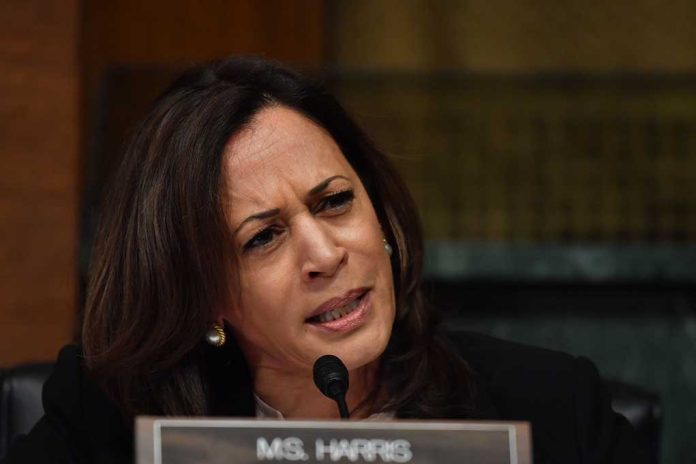
Vice President Kamala Harris advocates for abolishing the Senate filibuster to codify Roe v. Wade, contradicting her previous stance and sparking debate among Democrats.
At a Glance
- Harris supports eliminating the filibuster to codify abortion rights with 51 votes
- This stance contradicts her 2017 position on preserving the filibuster
- The move aims to distinguish Democrats from Republicans on abortion issues
- Some Democrats, including Sens. Manchin and Sinema, oppose changing filibuster rules
- Critics argue this shift could lead to future legislative instability
Harris’s Shifting Stance on the Filibuster
Vice President Kamala Harris has recently taken a bold stance that has raised eyebrows across the political spectrum. In a surprising move, Harris publicly endorsed eliminating the Senate filibuster to codify Roe v. Wade into federal law.
This dramatic shift from her previous position has ignited a fierce debate about the role of the filibuster in our legislative process and the potential consequences of its removal.
Harris’s new position stands in stark contrast to her earlier views. In 2017, she was among 61 senators who signed a bipartisan letter urging the preservation of the filibuster. The letter emphasized the importance of extended debate in the Senate, highlighting the filibuster’s role in fostering bipartisan cooperation. This abrupt about-face raises questions about Harris’s consistency and the motivations behind such a significant policy shift.
Vice President Kamala Harris announced Tuesday that she would support eliminating the filibuster in the Senate for the purpose of codifying abortion protections previously offered under Roe v. Wade into federal law.https://t.co/ZxfVj3abbU
— KOMO News (@komonews) September 24, 2024
The Implications of Eliminating the Filibuster
The filibuster has been a cornerstone of Senate procedure since 1789, requiring a supermajority of 60 votes to end debate on legislation. This rule has long been viewed as a safeguard against rapid, partisan changes to our laws. By advocating for its removal, even for a specific issue, Harris and her allies may be opening a Pandora’s box of unintended consequences.
Senator Kyrsten Sinema’s warning underscores the potential for this move to backfire spectacularly. If the filibuster is eliminated, it could pave the way for drastic policy swings with each change in Senate majority. This instability could have far-reaching effects on various issues, not just abortion rights.
Democratic Division and Political Maneuvering
Harris’s stance has exposed deep divisions within the Democratic Party. While some progressives support the move, moderate Democrats like Senators Joe Manchin and Kyrsten Sinema have reaffirmed their commitment to preserving the filibuster. This internal conflict could potentially weaken the party’s unity at a critical time.
Senator Manchin’s strong rebuke of Harris’s position highlights the gravity of this issue for many Democrats who value bipartisanship and legislative stability. The filibuster has long been seen as a tool for fostering compromise and preventing the tyranny of a narrow majority. By advocating for its removal, Harris risks alienating moderate voters and potentially handing Republicans a potent campaign issue.
The Broader Implications for American Democracy
While Harris frames this as a necessary step to protect abortion rights, the implications of her stance reach far beyond this single issue. The filibuster has been a crucial check on majority power, ensuring that significant legislative changes require broad consensus. By advocating for its removal, even for a specific purpose, Harris is potentially opening the door to a more volatile and partisan legislative process.
Critics argue that this move is less about protecting rights and more about political posturing. With the 2024 election looming, Harris’s stance appears calculated to energize the Democratic base and draw a sharp contrast with Republican positions on abortion. However, this strategy risks further polarizing an already divided electorate and could set a dangerous precedent for future policy-making.
As the debate over the filibuster and abortion rights continues, it’s clear that Harris’s evolving stance represents more than just a policy shift. It signals a potential sea change in how our legislative process functions and raises profound questions about the future of American democracy. Voters will need to carefully consider the long-term implications of such a significant change to our system of governance.






















